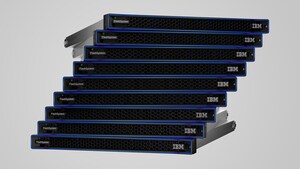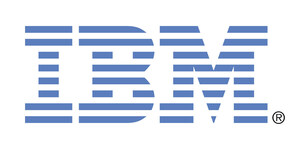
YORKTOWN HEIGHTS, N.Y., Sept. 13, 2017 /PRNewswire/ -- IBM (NYSE: IBM) scientists have developed a new approach to simulate molecules on a quantum computer that may one day help revolutionize chemistry and materials science. The scientists successfully used a seven-qubit quantum processor to address the molecular structure problem for beryllium hydride (BeH2) – the largest molecule simulated on a quantum computer to date. The results demonstrate a path of exploration for near-term quantum systems to enhance our understanding of complex chemical reactions that could lead to practical applications.
The team implemented a novel algorithm that is efficient with respect to the number of quantum operations required for the simulation. Using six qubits of a seven-qubit processor they were able to measure BeH2's lowest energy state, a key measurement for understanding chemical reactions. While this model of BeH2 can be simulated on a classical computer, IBM's approach has the potential to scale towards investigating larger molecules that would traditionally be seen to be beyond the scope of classical computational methods, as more powerful quantum systems get built. The results were published today as the cover of the peer-reviewed journal Nature*.
To help showcase how quantum computers are adept to simulating molecules, developers and users of the IBM Q experience are now able to access a quantum chemistry Jupyter Notebook. The open source quantum chemistry Jupyter Notebook (available through the open access QISKit github repo) allows users to explore a method of ground state energy simulation for small molecules such as hydrogen and lithium hydride. Over a year ago, IBM launched the IBM Q experience by placing a robust five-qubit quantum computer on the cloud for anyone to freely access, and most recently upgraded to a 16-qubit processor available for beta access.
The interplay of atoms and molecules is responsible for all matter that surrounds us in the world. However, even today's most powerful supercomputers cannot exactly simulate the interacting behavior of all the electrons contained in a simple chemical compound such as caffeine. The goal is that we will have the ability to use quantum computers to wholly analyze molecules and chemical reactions, which could help accelerate research and lead to the creation of novel materials, development of more personalized drugs, or discovery of more efficient and sustainable energy sources.
"Thanks to Nobel laureate Richard Feynman, if the public knows one thing about quantum, it knows that nature is quantum mechanical. This is what our latest research is proving – we have the potential to use quantum computers to boost our knowledge of natural phenomena in the world," said Dario Gil, vice president of AI research and IBM Q, IBM Research. "Over the next few years, we anticipate IBM Q systems' capabilities to surpass what today's conventional computers can do, and start becoming a tool for experts in areas such as chemistry, biology, healthcare and materials science."
"The IBM team carried out an impressive series of experiments that holds the record as the largest molecule ever simulated on a quantum computer," said Alán Aspuru-Guzik, professor of chemistry and chemical biology at Harvard University. "When quantum computers are able to carry out chemical simulations in a numerically exact way, most likely when we have error correction in place and a large number of logical qubits, the field will be disrupted. Exact predictions will result in molecular design that does not need calibration with experiment. This may lead to the discovery of new small-molecule drugs or organic materials."
Instead of forcing previously known classical computing methods onto quantum hardware, the scientists reversed the approach by building an algorithm suited to the capability of the current available quantum devices. This allows for extracting the maximal quantum computational power to solve problems that grow exponentially more difficult for classical computers. To characterize the computational power, IBM has adopted a new metric, Quantum Volume. It accounts for the number and quality of qubits, circuit connectivity, and error rates of operations. You can learn more here: https://ibm.biz/BdiaQe.
Chemistry is one example of a broader set of problems that quantum computers are potentially well-suited to tackle. Quantum computers also have the potential to explore complex optimization routines, as might be found in transportation, logistics or financial services. They could even help advance machine learning and artificial intelligence, which relies on optimization algorithms. Earlier this year, IBM scientists and collaborators demonstrated there is a defined advantage to run a certain type of machine learning algorithm on a quantum computer.
For future quantum applications, IBM anticipates certain parts of a problem to be run on a classical machine while the most computationally difficult tasks might be off-loaded to the quantum computer. This is how businesses and industries will be able to adopt quantum computing into their technology infrastructure and solutions. To get started today, developers, programmers and researchers can run quantum algorithms, work with individual quantum bits, and explore tutorials and simulations on the IBM Q experience. As well, IBM has commercial partners exploring practical quantum applications through the IBM Research Frontiers Institute.
*Abhinav Kandala, Antonio Mezzacapo, Kristan Temme, Maika Takita, Jerry M. Chow, and Jay M. Gambetta. "Hardware-efficient Variational Quantum Eigensolver for Small Molecules and Quantum Magnets." Nature. doi:10.1038/nature23879
To read more on the methodology of IBM's new approach to quantum chemistry, please visit: http://ibm.biz/Bdjjg5.
About IBM Q
For more information on IBM's quantum computing efforts, please visit www.ibm.com/ibmq.
About IBM Research
For more than seven decades, IBM Research has defined the future of information technology with more than 3,000 researchers in 12 labs located across six continents. Scientists from IBM Research have produced six Nobel Laureates, 10 U.S. National Medals of Technology, five U.S. National Medals of Science, six Turing Awards, 19 inductees in the National Academy of Sciences and 20 inductees into the U.S. National Inventors Hall of Fame.
Chris Nay
IBM Media Relations-Research
[email protected]
512-286-7727
Christine Vu
IBM Media Relations-Research
914-945-2755
[email protected]
SOURCE IBM






Share this article